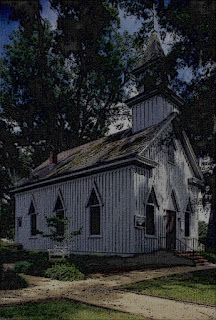What we don’t always see…
My parents married in 1959 when both were 42 years of age.
My father, a gregarious, fun-loving, social butterfly of a man, had been
widowed just a few years before; his first wife had died of cancer. My mother
was a quiet school teacher who kept to herself, teaching in a community not far
from where she’d grown up just outside of Mobile. They met at church, and,
albeit an unlikely pair, had decided to marry after a two-year courtship.
There was much that my father didn’t know about my mother.
She suffered from schizophrenia, and what he might have chalked up to
eccentricities was far more than that. The “thing” about which no one in her
family spoke was her paranoia about absolutely everything – and which
ultimately severed her relationships from family, church members and neighbors.
From what her sisters and aunt described of her wedding day, my mother suffered
a full-blown anxiety attack, and she and my father didn’t share the same
household for months after their marriage because she simply couldn’t bring
herself to share a home with this man who was now her husband.
But time passed, and my father was patient. Later that year,
he planned a honeymoon that would take them through Georgia, South and North
Carolina and into Virginia, allowing my mother to travel outside of the state
of Alabama for the very first time in her life. The Negro Motorist book was
their guide for accommodations as they made their way. It became slow progress,
but eventually, my mother was able to let go of enough of her fears to be able
to share a home with her husband.
Life was never normal. My mother’s fear and paranoia led to
inexplicable behavior that defined our life and left others more than whispering behind our backs. Reading and music became my best friends,
literally transporting me from our sad home to another place. My father was not
so lucky: He learned to cope, but through working multiple jobs and drinking
far too much. But he managed to keep his own sanity, always provided for his
family, and, until death did them part 48 years later, remained in a marriage
from which some men might have fled in the first few days, and certainly within
the first few months.
There was a lot for which I never gave my father credit when
I was growing up; I kept thinking that things could have been so much better if
he could just have been home more, if he could just have been with me more. It took far too long for me to truly begin to understand that, during a
time when it was even more difficult than it is today to get help for a loved
one who is suffering from mental illness, he had done the absolute best that he
could under enormously trying circumstances. And I began to understand, too, just how much he
had given up of the life he once knew for my mother and for me.
And so, Dad, here’s to you, for remaining faithful, for dutifully serving your
country, for always maintaining (and teaching me) your exemplary work ethic, and for never
failing to believe that God would take care of you even in what appeared to be an impossible
situation. Here's to you for all of the times that, wallowing in my own self-pity, I failed to recognize what you endured and sacrificed in order for me to have a roof over my head, clothes on my back, and food to eat. Here's to you for the pride that you took in everything that I accomplished. I hope that you’re enjoying a slice or two of the apple pie that you
loved so much, with a big, strong cup of black coffee.
And for everyone who – like me – sometimes has trouble
catching a glimpse of the magnificence of the forest through all of the thicket
of trees, here’s to you, too, hoping that you’ll take time today, and every
day, to consider the difficult choices made, and difficult paths traveled, by
those we have yet to come to know and fail to appreciate as much as we should.
And for everyone whose life is impacted in any way by mental
illness, please know that you are not alone. You are loved, especially by our
Creator God. Please talk to someone, and please try to find resources to help
you in the journey.









